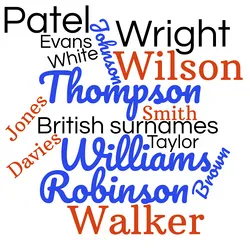
British surnames originate in the British Isles and have, since their inception, usually been inherited by children from their father and women have taken their husband’s name after marriage. Some exceptions are noted below.
For thousands of years, the British Isles and, more particularly, England have been recipients of immigration from Europe and, more recently, the nations of the Commonwealth. Earlier waves of immigrants pushed native people West and North into Scotland, Ireland and Wales where names still differ materially from England.
Origin of surnamesOrigin of surnames
Before the Norman conquest, people simply had one given name. Afterward, some Norman noble families carried a suffix denoting their place of origin. As the population grew, and governments wished to levy taxes, there became a need to distinguish between the many Williams, Marys, Edwards and Johns. This was done by means of a suffix, which then often became hereditary. It is commonly accepted that surnames came into general use in the 1400s.
Types of surname originTypes of surname origin
Listed below are the most common forms of surname origin, with examples:
- Occupational (or Metonymic) - This category refers to the job of the original holder. Since sons frequently followed in their fathers’ footsteps it is easy to see how their surnames would be regarded as heritable. Examples are legion: Smith, Wright, Baker, Taylor, Walker and so on. Many are names of trades that were common in the Middle Ages which have since practically died out, like Fletcher – a maker of arrows, Pargeter – a plasterer, Hayward – a keeper of hedges, and Chapman – a market trader. There is a sub-category of occupational names, most likely taken by servants of the person who had the particular role. Included here are names like Abbott, Bishop, KIng, Monk and Nunn.
- Patronymic - These are surnames derived from the name or role of a father, often with a suffix or prefix added meaning “son of” (-son, Mac-, O’, or Fitz-). Some examples include Jones, Johns, Johnson, Williams, Williamson, O’Brien, MacDonald, FitzGerald, and the like. Less obvious are names like McGill – son of a foreigner, Quayle – from MacPhail, meaning son of Paul, Bowen – from the Welsh ‘ap Owen’ and Watson – son of Walter
- Matronymic - Similarly, these are surnames derived from the name of a mother. These are less common than patronymic surnames. Margetson, son of Margaret, is a good example.
- Toponymic - These are names deriving from actual places, usually associated with the origin of the first name holder. Some are derived from larger regions or countries, like Germany, Flanders or Wiltshire. Many are village names, like Beckham or Helmsley. Some are even more remote, like Adamthwaite, a single cottage in Cumbria.
- Topographic - These names derive from landscape features, like Bridge, Green, Hill, or Langridge. Less frequent and older are names like Atwater, Athill, Atwell, from the Saxon word “atte” meaning “by the”.
- Nicknames or personal appearance - Here we have names such as Cruikshank (meaning crooked legs), Brown, Short, Longfellow, Fox, Salmon, Redhead and so on.
Some final notesSome final notes
Surnames beginning with ‘Mac’, or ‘Mc’ are predominantly Scottish, those beginning O’ or ‘Fitz’ are mainly Irish, although the latter has a Norman origin. Similarly, ‘ap’ was used in Wales to denote “son of”.
Within the United Kingdom, Scotland has a separate legal system, under which married women are referred to by their maiden name, though most women in practice take their husband’s name.
In Wales, a patronymic system was used throughout the more traditional/remote parts of the principality. For example, if David Jones had a son, his name might be Richard Davies, and his son William Pritchard (a contraction of ‘ap Richard’) and so on. Patronymics finally died out in the 1840s, being replaced by regular hereditary surnames. This is the primary reason behind the small number of surnames in Wales.
In England and Wales, at least, one can change one’s surname with no legal formality at all, as long as there is no intent to deceive. So one can find examples of individuals changing their surname for inheritance reasons and so on.
Modern immigration from East Africa and the Indian sub-continent has brought surnames like Patel, Khan and Begum, which are increasingly common, but not originating in Great Britain.
See alsoSee also
- Anglo-Saxon surnames
- German surnames
- English surnames
- Danish surnames
- Arabic surnames
- Polish surnames
- Afrikaans surnames
- Greek surnames
- Portuguese surnames
- Sephardic Jewish surnames
- Latvian surnames
- Lithuanian surnames
- Ashkenazi Jewish surnames
- Chinese surnames
- Indian surnames
- Indian surnames
- Viking surnames
- Scottish surnames
- Welsh surnames
- Cornish surnames
- Canadian surnames
- New Zealand surnames
- American surnames
- Irish surnames
- French surnames
- Dutch surnames
- Italian surnames
Explore more about British surnamesExplore more about British surnames
- Wikipedia - https://en.wikipedia.org/wiki/Surname
- BBC History - https://www.bbc.co.uk/history/familyhistory/get_started/surnames_01.shtml
- Modern British Surnames: by the late Philip Dance: https://one-name.org/modern-british-surnames/
- British surnames website: https://britishsurnames.co.uk/
- A Dictionary of British surnames – Reaney, 1958, Routledge & Paul
- A Dictionary of English surnames – Reaney & Wilson, 1997, Oxford University Press
- The Oxford Dictionary of Family Names in Britain and Ireland – Hanks et al, 2016, Oxford University Press
- Mapping British surnames: https://www.surnamemap.eu/unitedkingdom/surnames_ranking.php

